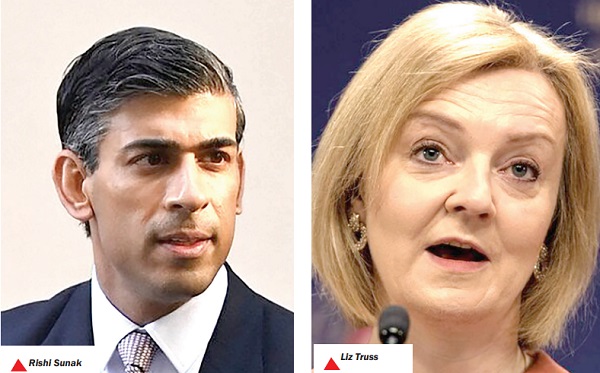
Boris Johnson’s successor to be named in September
The race to succeed Boris Johnson as British Prime Minister began with 11 candidates but was reduced to the final two candidates last Wednesday, Rishi Sunak and Liz Truss. The two will go forward for a summer of campaigning to win over the around 200,000 Conservative Party members who will make the final decision.
The Conservative leadership contest was triggered last week following one of the most remarkable periods in modern British political history, when more than 50 government ministers quit, denouncing PM Johnson’s character, integrity and inability to tell the truth.
Advertisement
Conservative lawmakers
The new leader will be chosen in a two-stage election. In the first phase, the 358 Conservative lawmakers in the House of Commons will winnow the field to two candidates through a series of elimination votes. The final pair will be put to a mail-in ballot of all party members across the country.
Under Britain’s Parliamentary System, Boris Johnson’s replacement will automatically become prime minister without the need for a general election and the race is set to conclude on September 5, the ruling Conservative party said last Monday.
“I am very keen we get this concluded as smoothly, cleanly, and rapidly as possible,” said Graham Brady, the chair of the 1922 Committee of nonministerial Tory MPs in parliament, which is leading the selection process.
Parliamentary stage
The Conservatives’ 1922 Committee, which runs leadership contests, is set to elect a new executive, which will lay out rules for the contest and the committee wants to complete the parliamentary stage of the election by the time lawmakers break for the summer on July 21. That would mean a summer second round with a new leader in place by the time the House of Commons returns September 5.
Following his formal resignation in London on Thursday, July 7, 2022, Prime Minister Boris Johnson said he would remain as British Prime Minister while a leadership contest is held to choose his successor.
Caretaker Prime Minister
But many Conservatives are wary of leaving Johnson in office for too long, saying a lame-duck leader is the last thing the country needs with war raging in Ukraine, food and energy price increases driving inflation to levels not seen in decades and growing labour unrest.
Some also worry that Johnson, brought down by scandals over money, rule-breaking and his handling of sexual misconduct allegations against lawmakers could do mischief even as a caretaker Prime Minister.
The candidates immediately launched their campaigns to replace recently resigned Prime Minister Boris Johnson but the number whittled to four with the voting process beginning last Monday which eliminated seven aspirants, putting Britain’s Former Finance Minister, Rishi Sunak in the lead.
The race begins
The race started with 11 candidates who announced leadership bids but only eight got the required backing of 20 MPs needed to get through the first round of voting last Tuesday.
The contenders are Foreign Secretary, Liz Truss, who has been an MP since 2010 and began rising up the ministerial ladder soon after entering parliament. She is the longest continuously serving member of the cabinet, having held positions under David Cameron, Theresa May and Boris Johnson; Junior Minister, Rehman Chishti; current Treasury Chief, Nadhim Zahawi; former Treasury Chief, Rishi Sunak; former Health Secretaries Sajid Javid and Jeremy Hunt, and backbench lawmakers, Tom Tugendhat and Kemi Badenoch.
The rest are Suella Braverman, Penny Mordaunt and Former Equalities Minister, Kemi Badenoch, who grew up in Nigeria and has been an MP since 2017. At the age of 42, she, like Mr Sunak, would be the youngest Prime Minister to enter Downing Street in more than 200 years if they win.
That was whittled down to six following the first round of voting last Wednesday, when Chancellor Nadhim Zahawi and Jeremy Hunt were eliminated from the race and then again to five when Suella Braverman was ruled out last Thursday.
More eliminations
Last Monday, Tom Tugendhat was knocked out of the race, leaving just our standing before another ballot on Tuesday ahead of the group being whittled down to the final two by the end of the week. At Last Monday’s polls Sunak got 115 votes in the third ballot of Conservative lawmakers just 5 short of the 120 he needs to clinch it, ahead of former Defence Minister, Penny Mordaunt with 82, Foreign Secretary Liz Truss with 71 and Kemi Badenoch.
In a bid to speed up the process, candidates must have at least 20 MPs backing them in order to enter the race, up from the usual eight, and any candidate who fails to get the support of 30 MPs in the first ballot will be eliminated.
The issue of tax cuts was fast becoming the central battle in the race with nearly all of the candidates promising to cut business or personal taxes.
Britain’s economy
Whoever wins the leadership race will be faced with a daunting in-tray as Britain’s economy is facing rocketing inflation, high debt and low growth, with people coping with the tightest squeeze on their finances in decades, all set against a backdrop of an energy crunch exacerbated by the war in Ukraine which has sent fuel prices soaring.
On the issue of immigration, all the main leadership candidates have pledged to keep the government’s policy of sending asylum seekers to Rwanda, showing how the party has moved to the right of the political spectrum in recent years.



